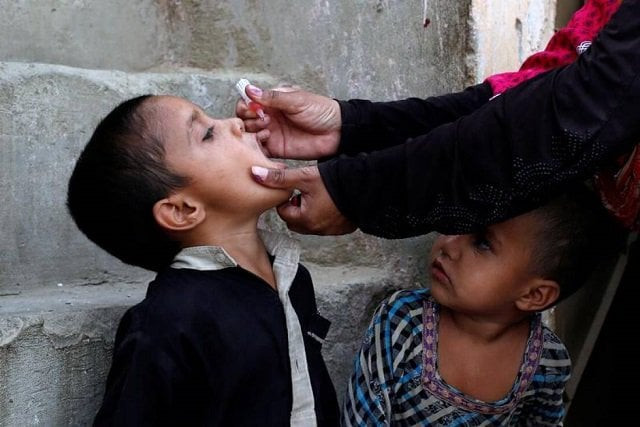Health officials plan to tackle ‘fake news’
Strategy involves suing media houses for running unverified news

Representational image. PHOTO: REUTERS
Authorities involved in the polio eradication campaigns across Khyber-Pakhtunkhwa (K-P) held a meeting on Tuesday where they discussed the dissemination of fake news on various media outlets and other platforms and the impact they have had on the campaign.
They particularly discussed the role of social media websites and how they are being used by different people as a propaganda tool against the campaigns.
Health officials claim that the anti-polio programme was at its peak in recent years, corresponding with a sharp drop in poliovirus cases, down from 68 in 2014 to just one in 2017 and none so far this year.
Similarly, over the past two years, not even a single case has been reported from the provincial capital which was once considered a hub for the polio virus.
The polio season
Officials, however, claim that different news stories, even those pertaining to other viral infections were linked with the spread of the poliovirus, whether intentionally or unintentionally. One result of this fake news, officials pointed out, was that people panicked and refused to allow the measles vaccine to be administered to their children.
“Whenever we claim the virus was on the verge of eradication, suddenly we find something which has an adverse effect on our [vaccination] drives,” a senior official, who is involved in the polio eradication programme, told The Express Tribune.
He stated that a few years ago, the anti-polio and the anti-measles vaccination campaigns were underway when a few kids fell ill soon after receiving the measles vaccine. However, the media linked the incident with the polio vaccination campaign.
The official said that if an individual could sue a media organisation for running an ‘unconfirmed’ news story, an organisation could too.
“Yes, I agree the news stories were later rectified, but they had already done the damage,” lamented the official, who requested anonymity since he was not entitled to speak to the media.
“Had they contacted us and confirmed the facts, there would have been no complications for us,” the official added.
Polio and Pakistan
The Khyber-Pakhtunkhwa Emergency Operations Center (EOC) Coordinator Atif Rehman stated that there was a dire need for confirming news stories, especially when it involves the poliovirus since the virus had crippled hundreds for life.
“This [polio virus] cripples [the victim] for life. it cannot be cured but can be prevented and luckily we have successfully stopped its transmission but we still have a long way to go, eradication will take time,” Rehman told The Express Tribune, adding, “We are in contact with different government organisations and will soon come up with a plan for what action needs to be taken if someone carries ‘unconfirmed’ news story.”
A total of eight polio cases were reported across the country in 2017 with only one reported from K-P. So far in 2018, only three polio cases have been confirmed, all of them coming from a specific region in Balochistan.
Published in The Express Tribune, June 20th, 2018.













COMMENTS
Comments are moderated and generally will be posted if they are on-topic and not abusive.
For more information, please see our Comments FAQ